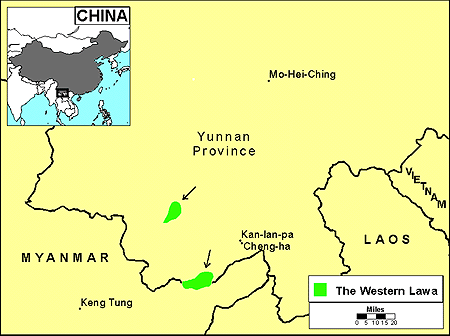![[IMAGE]](http://www.prayway.com/unreached/images/0148.jpg) The Western Lawa inhabit the mountains and valleys in the Yunnan province of southern China. They are divided into two nationalities, the Blang and the Va.
The Western Lawa inhabit the mountains and valleys in the Yunnan province of southern China. They are divided into two nationalities, the Blang and the Va. Although the Westeren Lawa are related to the Eastern Lawa of Thailand, there are no similarities in their dialects. The Western Lawa were gradually reduced in number and forced into the hills, possibly by migrating Chinese who took over the more desirable land areas. During the Chinese Cultural Revolution (between 1965 and 1976) more than 60 million students, officials, peasant migrants, and unemployed were sent to the countryside to settle borderlands for economic reasons. Otherwise, the minorities are little affected by changes in the rest of the country.
The Lawa are known as great ironsmiths, but very little of their work is exported due to lack of transportation. Isolation has helped them retain their traditions.
What are their lives like
Traditionally, the Western Lawa only divided their land between families; it could not be sold. If a villager migrated out, the land he owned would be returned to the village. However, since 1956, the control of all land has been transferred to the Chinese government.
The Western Lawa who live in the hills generally have a lower standard of living than those in the valleys, and they speak only Western Lawa. For this reason, there is a steady trickle of migration from the hills into the valleys. Where the land permits, the Lawa cultivate rice, pickled tea, and some opium.
There has been some development in the remote regions of western Yunnan recently, even though goods are still transported on men's backs or by pack animals. Truck transport does reach most villages, bringing necessities to the farmers and enabling their products to be sold in distant markets.
Traditionally, the Lawa selected the oldest male of the family as a village head. They also elected a chief to be a representative of the village. However, since the Chinese Communist government was established in 1949, the administrative system has been submitted to the Communists. They have divided the country into provinces, districts, cities, counties, regions, townships, and local peoples.
Although there is a birth limit of only one child per family in China, the Western Lawa are exempt from this law. They may have two or more children if their living conditions permit them. Education is inadequate, giving rise to an illiteracy rate that is second only to Tibet.
What are their beliefs?
In the 1960's, a French missionary reported that the Lawa were identical to the "Wild Wa," a headhunting people group of northern Burma and southwestern China. However, since many Western Lawa have adapted to the prevailing Buddhist culture, it is possible that they have abandoned headhunting.
Half of the Western Lawa practice ethnic religions such as animism (a belief that non-human objects have spirits). The villagers believe in house spirits, local spirits, and spirits of the iron mines. They also rely heavily on witchdoctors. Many deities are regarded as disembodied spirits of ancient heroes.
Forty-eight percent of the Western Lawa claim to be Buddhists. Buddhist practices have had a greater affect on the animists living in the valleys than those in the hillls; however, they are still referred to as "Buddhist animists."
What are their needs?
Education is vital for the Western Lawa since most of them cannot read or write. They also desperately need teachers to help them understand the portions of the New Testament that they have access to, lest there be Christian animists as well as the Buddhist animists.
The Western Lawa do not have the Jesus film or any Christian broadcasts available to them, neither are there any missions agencies working among them. Presently, there are only a handful of known Christians.
Prayer Points
- Take authority over the spiritual principalities and powers that are keeping the Western Lawa bound.
- Ask the Lord to call missionaries and teachers who are willing to go to China and share Christ with the Western Lawa.
- Pray that the doors of China will soon open to missionaries.
- Ask God to strengthen, encourage, and protect the small number of Western Lawa Christians.
- Pray that God will raise up qualified linguists to translate the Bible into the Lavua language.
- Ask the Holy Spirit to soften the hearts of the Western Lawa toward Christians so that they will be receptive to the Gospel.
- Pray that God will open the hearts of China's governmental leaders to the Gospel.
- Ask the Lord to raise up a strong local church among the Western Lawa .

See also the following Group:
The Bulang of China
Statistics
Latest estimates from the World Evangelization Research Center.
THE PEOPLE
- People name: Western Lawa
- Country: China
- Their language: lavua
- Population:
- Largest religion:
- Christians: 2%
- Church members: 1,589
- Scriptures in their own language: New Testament
- Jesus Film in their own language: None
- Christian broadcasts in their own language: None
- Mission agencies working among this people: None
- Persons who have heard the Gospel: 16,700 (21%)
- Persons who have never heard the Gospel: 62,700 (79%)
- Country: China
- Population:
- Major peoples in size order:
- Major religions:
- Number of denominations: 42






No comments:
Post a Comment